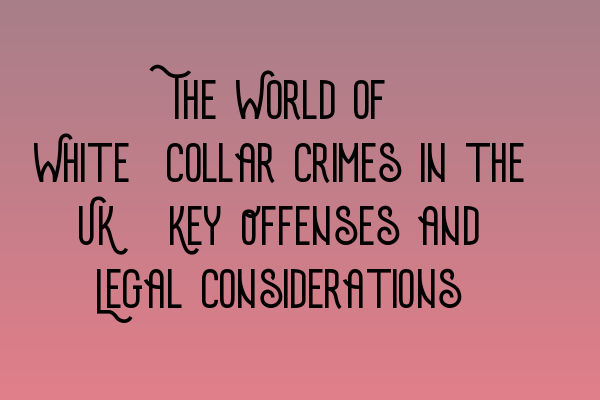The World of White-Collar Crimes in the UK: Key Offenses and Legal Considerations
White-collar crimes are non-violent offenses typically committed in a business or professional setting, involving deceit, fraud, or dishonesty for financial gain. In the UK, these crimes are taken seriously and can lead to severe penalties, including imprisonment and fines. As a solicitor at SQE Criminal Law & Practice Law UK, I have encountered various white-collar crime cases, and in this article, I will provide you with an overview of key offenses and legal considerations related to white-collar crimes in the UK.
Fraud
Fraud is one of the most prevalent white-collar crimes in the UK. It involves intentionally deceiving another person or entity for personal gain. Fraud can take various forms, such as:
- Insurance fraud: Falsifying insurance claims to obtain financial benefits.
- Mortgage fraud: Providing false information to obtain a mortgage loan.
- Tax evasion: Illegally avoiding paying taxes.
If you are accused of fraud, it is essential to seek legal representation immediately. An experienced white-collar crime solicitor can help build a strong defense and protect your rights throughout the legal process.
Bribery and Corruption
Bribery and corruption involve offering, giving, receiving, or soliciting something of value with the intent to influence the actions of an individual in a position of power. In the UK, bribery and corruption are criminal offenses under the Bribery Act 2010. It is crucial for individuals and businesses to have robust anti-bribery policies in place to prevent any involvement in such activities.
Embezzlement
Embezzlement refers to the misappropriation or theft of funds entrusted to someone’s care, typically an employee or a corporate executive. It is a serious offense that can lead to lengthy prison sentences and substantial fines. If you suspect embezzlement within your organization, it is crucial to investigate and seek legal advice to protect your interests.
Money Laundering
Money laundering involves transferring funds derived from criminal activity into legitimate sources to make them appear legal. The Proceeds of Crime Act 2002 criminalizes money laundering in the UK. Both individuals and businesses can be held liable for money laundering offenses. Implementing robust anti-money laundering procedures is crucial for businesses to prevent inadvertently getting involved in such activities.
Insider Trading
Insider trading occurs when a person uses non-public information to make financial trades, taking advantage of confidential information for personal gain. The UK has strict regulations to prevent insider trading, and individuals found guilty can face severe penalties, including imprisonment and fines.
Understanding the various white-collar crimes and their legal ramifications is essential for individuals and businesses operating in the UK. By adhering to legal and ethical standards, you can mitigate the risk of becoming entangled in white-collar crime investigations.
If you require legal assistance or advice regarding any white-collar crime matter, do not hesitate to contact SQE Criminal Law & Practice Law UK. Our team of experienced solicitors is here to guide you through the legal process and ensure your rights are protected.
Related Articles:
- LLC Formation Made Simple: Step-by-Step Guide for UK Entrepreneurs
- LLC Formation: A Step-by-Step Guide for UK Entrepreneurs
